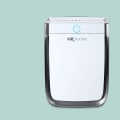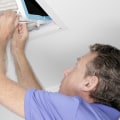When it comes to air conditioning filters, MERV 13 is the best choice for those with allergies and asthma. These filters are designed to help your family breathe better and provide a cleaner indoor environment. They have a MERV rating of 9 to 13, fit well, and should be replaced or cleaned regularly. MERV 13 filters are effective in controlling airborne bacteria, most tobacco smoke, sneezing-related contaminants, dust, pollen, dust mites, and pet dander.
They can also block most virus-carrying bacteria and particles, making them ideal for those with weakened immune systems or lung problems. In fact, there aren't many particles in the air that a MERV 13 air filter can't trap. Efficiency Reporting Minimum Value (MERV) is a filter rating system used to standardize and simplify filter efficiency ratings for the public. The higher the MERV rating, the higher the efficiency of the air cleaner.
For example, a MERV 13 filter will remove smaller particles from the air than a MERV 8 (or lower) filter. This makes MERV 13 air filters ideal for removing allergens and particles that can trigger health problems. They are also great for trapping dust, pollen, mold and bacteria, smoke, smog, and even virus carriers. If you're looking for the best residential air filter for bacteria and airborne contaminants, then a MERV 13 air filter is your best bet.
It's one of the highest rated filters on the market and can provide a clean indoor environment for those with health concerns. However, if you simply need a filter to trap pollen, dust mites, and hair, then a MERV 8 filter should do its job. It's common in homes, commercial buildings, paint booths, and industrial workplaces. In conclusion, if someone needs a clean indoor environment for health reasons, then a MERV 13 air filter is the best option.
While it cannot provide a completely sterile environment - no air filter can do that - it will provide the cleanest air quality for your home.



